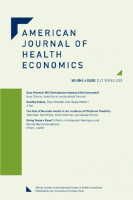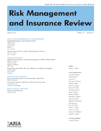
Geneva Risk and Insurance Review
Scope & Guideline
Advancing knowledge in risk and insurance dynamics.
Introduction
Aims and Scopes
- Risk Economics and Theory:
Explores foundational concepts in risk theory and economics, often examining how theoretical models apply to real-world insurance markets. - Insurance Market Analysis:
Analyzes various aspects of insurance markets, including competition, pricing strategies, and consumer behavior, with a focus on empirical evidence. - Health Insurance and Welfare Economics:
Investigates the interplay between health insurance systems, individual welfare, and public health outcomes, particularly in the context of policy implications. - Behavioral Economics in Insurance:
Examines how psychological factors influence risk perceptions and insurance demand, integrating behavioral economics into traditional insurance models. - Sustainability and Risk Management:
Addresses the challenges and strategies related to sustainability in insurance, particularly in the face of climate change and extreme weather events. - Development and Emerging Markets:
Focuses on the unique challenges of insurance in developing countries, including risk management practices and the role of insurance in economic development.
Trending and Emerging
- Big Data and Privacy Concerns:
The integration of big data in risk classification and the associated privacy implications is gaining traction, highlighting the need for ethical considerations in data usage. - Health Risk and Economic Behavior:
Research focusing on the intersection of health risks and economic behaviors, particularly in self-protection and health insurance, is on the rise, reflecting growing public health concerns. - Sustainability and Extreme Events:
Investigations into sustainability actions under uncertainty and the implications of extreme weather events are emerging as critical areas of study, driven by increased awareness of climate change. - Behavioral Insights in Insurance Decision-Making:
There is an increasing emphasis on understanding how cognitive biases and risk preferences influence insurance decisions, indicating a shift towards behavioral economics. - Insurance in Developing Contexts:
A growing body of research is dedicated to understanding insurance mechanisms in developing countries, addressing unique challenges and opportunities in these markets.
Declining or Waning
- Traditional Risk Models:
There seems to be a waning focus on purely traditional risk models without considering behavioral or market-based factors, indicating a shift towards more integrated approaches. - Static Analysis of Insurance Products:
Research that merely evaluates insurance products without considering dynamic market changes or consumer behavior is becoming less frequent. - Pensions and Long-Term Care Insurance:
Although still relevant, the frequency of publications specifically addressing pensions and long-term care insurance has decreased, possibly due to a broader focus on immediate health risks and insurance. - Generalized Insurance Theories:
Theoretical explorations that do not incorporate contemporary issues such as big data, privacy, and technology are receiving less attention, suggesting a trend towards more applied research.
Similar Journals

American Journal of Health Economics
Pioneering the economics of health and wellness.The American Journal of Health Economics is a premier academic publication dedicated to advancing the understanding of the economic aspects of health and healthcare. Published by the University of Chicago Press, this journal has established itself as a vital resource for researchers, policymakers, and health professionals since its convergence in 2015. With an impressive Q1 ranking in key categories—including Economics, Health Policy, and Public Health—and a solid reputation in the academic community, it ranks in the top 20% for Economics and Health Policy in the Scopus database. The journal seeks to publish high-quality, peer-reviewed articles that contribute to the discourse on health economics, addressing critical issues like health disparities, policy evaluation, and the efficiency of healthcare systems. Although it does not offer open access, subscribers can access groundbreaking research that shapes health economic strategies and practices. As a trusted source in its field, the American Journal of Health Economics plays a crucial role in fostering evidence-based decision-making and enhancing the impact of economic research in healthcare.

Risk Management-An International Journal
Charting the Course for Future Risk SolutionsRisk Management - An International Journal is a premier publication dedicated to advancing the understanding and methodologies of risk management across various sectors, including business, finance, and economics. Published by Palgrave Macmillan Ltd in the United Kingdom, this journal not only maintains a robust presence in the scholarly community but also ranks in the Q2 category for Business and International Management and Finance, as well as Q3 for Economics and Econometrics and Strategy and Management. With its diverse scope and commitment to high-quality research, the journal provides essential insights for academics, practitioners, and students alike, helping to shape the future of risk management practices globally. While not an open-access journal, its rigorous peer-review process ensures that only the most impactful and relevant studies are featured. Covering topics that converge the years from 2006 to 2024, Risk Management represents a vital resource for those looking to deepen their knowledge in this critical field.

Economics of Governance
Exploring the Nexus of Governance and Economics.Economics of Governance (ISSN: 1435-6104; E-ISSN: 1435-8131) is a distinguished journal published by SPRINGER HEIDELBERG, dedicated to advancing the field of governance economics. Established in 2003, this journal explores the intricate relationships between governance structures and economic performance, making it a vital resource for researchers, practitioners, and policymakers alike. With its impressive categorization in Q3 in Business and International Management and Q2 in Economics, Econometrics, and Finance (miscellaneous) as of 2023, it stands as a prominent platform for innovative research. Although it operates without open access, it attracts a robust readership owing to its critical analyses and high-quality contributions, fostering an understanding of governance mechanisms in a globalized economy. The journal also receives recognition within Scopus, ranking #139 in General Economics and #323 in Business and International Management, reflecting its influence in shaping current discourse and research trends. For those devoted to the economics of governance, this journal is a crucial asset that continually encourages scholarly inquiry and professional development.

Journal of Mathematics in Industry
Exploring Real-World Solutions with Mathematical RigorJournal of Mathematics in Industry, published by Springer, stands as a pivotal platform for researchers and professionals exploring the intersection of mathematical applications and real-world industrial challenges. With an impact factor signaling its robust influence in the field, the journal has distinguished itself within the Q3 quartile of applied mathematics, ranking 95 out of 635 according to Scopus, placing it in the 85th percentile among its peers. Since its inception in 2011, the journal has embraced the Open Access model, fostering a collaborative and unrestricted dissemination of knowledge. This initiative not only enhances visibility but also encourages engagement from a global audience eager to apply mathematical innovations in various industries. As the journal looks towards the future, it continues to bridge the gap between theoretical mathematical research and practical industrial applications, making it an invaluable resource for academics, practitioners, and students alike.

RISK MANAGEMENT AND INSURANCE REVIEW
Elevating Discourse in Risk Management and Financial ResilienceRISK MANAGEMENT AND INSURANCE REVIEW, published by Wiley, is a vital journal for researchers and practitioners in the fields of accounting, economics, and finance. With an ISSN of 1098-1616 and an E-ISSN of 1540-6296, this journal serves as a comprehensive platform for the dissemination of cutting-edge research and insights into risk management and insurance practices. Although it does not offer an open-access model, it is recognized for its rigorous peer-review process and maintains an impactful presence within the academic community, reflected in its 2023 Scopus rankings in various disciplines, including its Q3 quartile status across multiple categories. The journal's scope addresses key contemporary issues in risk assessment, financial stability, and insurance innovation, contributing significantly to the evolving discourse in these areas. As it converges from 2006 to 2024, RISK MANAGEMENT AND INSURANCE REVIEW continues to attract a diverse readership, providing valuable resources and fostering dialogue among students, professionals, and established researchers alike.

Mathematics and Financial Economics
Unlocking Financial Potential with Mathematical PrecisionMathematics and Financial Economics, published by Springer Heidelberg, is a leading peer-reviewed journal that explores the intersections of mathematical theories and financial practices. With an ISSN of 1862-9679 and an E-ISSN of 1862-9660, the journal has made notable contributions to its field since its inception in 2007, with a convergence period extending until 2024. Positioned in the prestigious Q2 category for both Finance and Statistics and Probability, the journal is ranked within the top 66th percentile in Mathematics and Statistics and the 62nd percentile in Decision Sciences according to Scopus metrics. Researchers and professionals looking for high-quality, innovative research in mathematical finance will find valuable insights within its pages. Although primarily a subscription-based journal, it aims to foster knowledge sharing among academia and industry experts. Its commitment to advancing quantitative methods and financial applications solidifies its importance as a resource for students, researchers, and practitioners dedicated to understanding and navigating the complex dynamics of financial markets.

METHODOLOGY AND COMPUTING IN APPLIED PROBABILITY
Innovating methodologies to connect theory with practice.METHODOLOGY AND COMPUTING IN APPLIED PROBABILITY is a distinguished journal published by SPRINGER, dedicated to advancing research in applied probability and its relationship with various computational methodologies. With an ISSN of 1387-5841 and an E-ISSN of 1573-7713, this journal provides a platform for innovative studies that bridge theory and practical application in the field of mathematics and statistics. Ranking in the Q2 category for Mathematics (miscellaneous) and Q3 for Statistics and Probability as of 2023, it reflects a robust academic discourse, featuring contributions that span a range of methodologies utilized in probability-related studies. The journal's sustained engagement in the academic landscape from 2004 to 2024 puts it at the forefront of ongoing developments in statistics and probability. Researchers, professionals, and students alike will find the insights found within to be invaluable for both theoretical understanding and practical implementation.

Journal of Insurance Issues
Elevating Understanding in the Insurance SectorJournal of Insurance Issues, published by the Western Risk & Insurance Association, stands as a pivotal platform for the exploration and dissemination of knowledge in the field of insurance and risk management. With an ISSN of 1531-6076 and an E-ISSN of 2332-4244, this journal delves into the complexities and evolving dynamics of insurance practices, policies, and theoretical underpinnings. Although not an open-access journal, it remains accessible to a broad audience, including academics, practitioners, and students eager to engage with rigorous research and innovative ideas. The journal is dedicated to enhancing understanding in critical areas such as risk assessment, regulatory impacts, insurance economics, and consumer behavior, thereby contributing significantly to the professional discourse within the insurance sector. Its robust editorial standards ensure that published works meet high-quality scholarly criteria, further establishing the journal as an essential resource for anyone interested in the multifaceted world of insurance.

Journal of Risk
Unraveling the Dynamics of Risk in a Changing WorldJournal of Risk, published by INCISIVE MEDIA, serves as an essential platform for scholars and practitioners in the fields of finance and strategic management. With an ISSN of 1465-1211 and an E-ISSN of 1755-2842, this journal explores the multifaceted nature of risk, encompassing theoretical frameworks, empirical investigations, and practical applications. Although currently classified in Q4 for both Finance and Strategy and Management categories as per 2023 standards, it provides a crucial forum for innovative research and thought leadership, addressing the challenges faced in understanding and managing risk in today’s dynamic environment. The journal, based in the United States, is committed to advancing knowledge and offering a platform for debate and dialogue in its convergence years from 2011 to 2024. Researchers, professionals, and students are encouraged to contribute their insights to enhance the academic discourse surrounding risk management.

Revue de l IRES
Connecting Research to Real-World ChallengesRevue de l'IRES is a distinguished journal published by the Institut de Recherches Économiques et Sociales (IRES), specializing in economic and social sciences. With the ISSN 1145-1378, this journal contributes significantly to the academic discourse by publishing high-quality research that addresses contemporary issues in the field. Although it does not currently operate under an Open Access model, it provides valuable insights through its rigorous peer-review process, ensuring the integrity and scholarly quality of its content. The journal is based in France, with its operations centered at 16 Boulevard Mont Est, 9ième étage, Noisy-le-Grand. Researchers, professionals, and students are encouraged to engage with the research published in Revue de l'IRES, which serves as a critical platform for advancing knowledge and policy-oriented discourse in economics and social sciences.